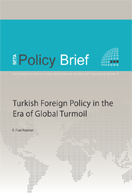Turkey’s rapid transition from a buffer state position to a pro-active and multi-dimensional diplomatic activism has led to ambiguities on the aim, intention and realism of the recent Turkish foreign policy.
Turkey’s rapid transition from a buffer state position to a pro-active and multi-dimensional diplomatic activism has led to ambiguities on the aim, intention and realism of the recent Turkish foreign policy. These ambiguities have turned into increased skepticism in certain parts of the western audience about the direction of Turkey. This essay contends that there are three forms of these skepticisms, two of which either are unable and inadequate to comprehend the new dynamics of Turkish foreign policy or don’t offer fair criteria to judge Turkish foreign policy. Instead, it offers three objective criteria, namely the environment, capacity and strategy, to examine both viability of the new pro-activism and its potential direction. Further, the study suggests that the sustainability of this multi-dimensional and constructive foreign policy activism requires Turkey to have European Union anchor as the main axis of its foreign policy and a consolidated democracy
*** In his influential work, The Grand Chessboard: American Primacy and its Geostrategic Imperatives, published in 1997, Zbigniew Brzezinski suggests that: "Gravely increasing the instability of the Eurasian Balkans and making the situation potentially much more explosive is the fact that two of the adjoining major nation-states, each with a historically imperial, cultural, religious, and economic interest in the region- namely, Turkey and Iran- are themselves volatile in their geopolitical orientation and are internally potentially vulnerable. Were these two states to become destabilized, it is quite likely that the entire region would be plunged into massive disorder, with the ongoing ethnic and territorial conflicts spinning out of control and the region’s already delicate balance of power severely disrupted. Accordingly, Turkey and Iran are not only important geostrategic players but are also geopolitical pivots, whose own internal condition is of critical importance to the fate of the region. Both are middle-sized powers, with strong regional aspirations and a sense of their historical significance." Since Brzezinski penned this description of Turkey in 1997, there has occurred a set of significant changes both globally and in Turkey, giving rise to radical transformations in our globalizing world, generating important impacts on Turkish foreign policy. Yet, Brzezinski’s diagnostic statement about Turkey, emphasizing both its regional power identity, and the importance of domestic stability for the sustainability of this role, has remained true. Turkey’s “geopolitical pivot” and “regional power” role in world politics has become even more important in recent years. Turkey has been expected to initiate a proactive, multi-dimensional and constructive foreign policy in many areas, ranging from contributing to peace and stability in the Middle East, to playing an active role in countering “terrorism” and extremism, from becoming a new “energy hub” to acting as one of the architects of “the inter-civilization dialogue initiative” aiming at producing a vision of the world, based on dialogue, tolerance and living together. Thus, there has been an upsurge of interest in, and a global attraction to, Turkey and its contemporary history. Moreover, the global attraction to Turkey has stemmed not only from the geopolitical identity of Turkey, as a strong state with the ca










